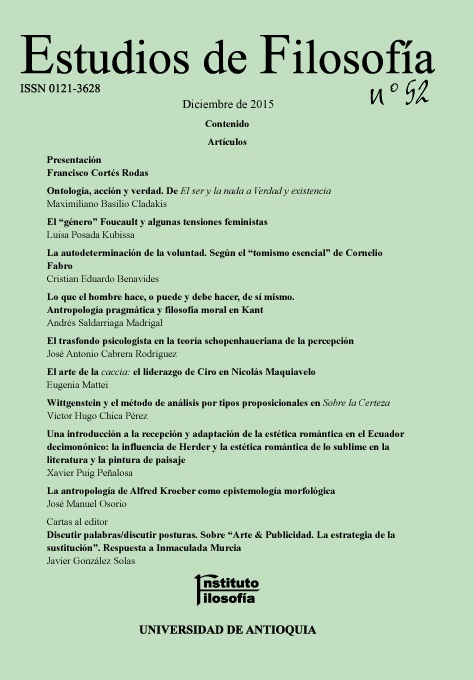Caccia‘s art: Cyrus’s leadership in Niccolò Machiavelli
DOI:
https://doi.org/10.17533/udea.ef.n52a07Keywords:
Cyrus, Machiavelli, people, leadershipAbstract
The main aim of this article is to analyze the figure of Cyrus in Niccolò Machiavelli’s work. For this purpose, we will provide a systematization of mentions of Cyrus in Machiavelli’s work –Discorsi and Il Principe-, so as to later tackle the specific uses Machiavelli gives to this figure based on his own queries. From that point, a series of assertions are derived about the relationship between the leader and the people, which are useful to delve into the Machiavellian undertaking.
Downloads
References
Jenofonte, (1982). Ciropedia. Madrid: Gredos.
_______. (1984). Obras menores. Madrid: Gredos.
Lefort, (1986). Le travail de l’œuvre Machiavel. Paris: Gallimard.
Machiavelli, N. (1971). Il Principe e Discorsi sopra la prima deca di Tito Livio. Milano: Feltrinelli.
_______. (2005). Opere III. Torino: Einaudi.
_______. (2013). Il Principe. Torino: Einaudi.
Maquiavelo, N. (1992). El príncipe. Madrid: Alianza.
_______. (2000) Discursos sobre la primera década de Tito Livio. Madrid: Alianza.
_______. (2009) Historia de Florencia., Madrid: Tecnos.
_______. (2012) El príncipe, Buenos Aires: Colihue.
Rodríguez, G. (2014). Políticas del dinero y economía del liderazgo: Jenofonte, Maquiavelo y Hamilton. En Borisonik, H. (ed) “Papel pintado, reflexiones sobre el dinero” Perspectivas. Revista de análisis de Economía, Comercio y negocios internacionales. Vol. 8, agosto de 2014. México: Universidad Autónoma de San Luis Potosí.
Rosello, D. (2013) La wertud maquiaveliana. El príncipe como centauro. En Sazo Muñoz, D. (ed.). La revolución de Maquiavelo. El Príncipe 500 años después. Santiago de Chile: CAIP-UAI-RIL.
Skinner, Q. (1998). Maquiavelo. Madrid: Alianza.
Published
How to Cite
Issue
Section
Categories
License
Copyright (c) 2015 Eugenia Mattei

This work is licensed under a Creative Commons Attribution-NonCommercial-ShareAlike 4.0 International License.
Authors who publish with this journal agree to the following terms:
1. The Author retains copyright in the Work, where the term "Work" shall include all digital objects that may result in subsequent electronic publication or distribution.
2. Upon acceptance of the Work, the author shall grant to the Publisher the right of first publication of the Work.
3. The Author shall grant to the Publisher a nonexclusive perpetual right and license to publish, archive, and make accessible the Work in whole or in part in all forms of media now or hereafter known under a Creative Commons Attribution-NoCommercia-ShareAlike (CC BY-NC-SA 4.0), or its equivalent, which, for the avoidance of doubt, allows others to copy, distribute, and transmit the Work under the following conditions: (a) Attribution: Other users must attribute the Work in the manner specified by the author as indicated on the journal Web site;(b) Noncommercial: Other users (including Publisher) may not use this Work for commercial purposes;
4. The Author is able to enter into separate, additional contractual arrangements for the nonexclusive distribution of the journal's published version of the Work (e.g., post it to an institutional repository or publish it in a book), as long as there is provided in the document an acknowledgement of its initial publication in this journal;
5. Authors are permitted, and Estudios de Filosofía promotes, to post online the preprint manuscript of the Work in institutional repositories or on their Websites prior to and during the submission process, as it can lead to productive exchanges, as well as earlier and greater citation of published work (see The Effect of Open Access). Any such posting made before acceptance and publication of the Work is expected be updated upon publication to include a reference to the Estudios de Filosofía's assigned URL to the Article and its final published version in Estudios de Filosofía.















